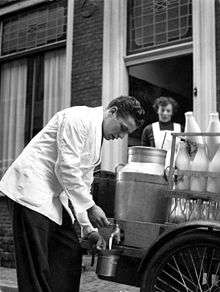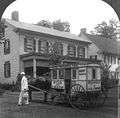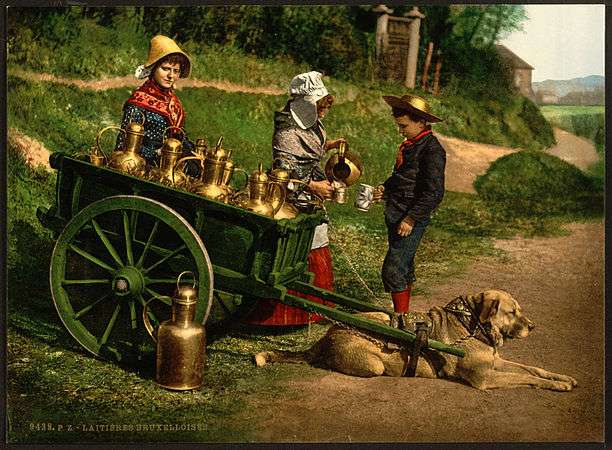Milkman
A milkman is a person who delivers milk in milk bottles or cartons.
Milk deliveries


Truck drivers who transport milk from a farm to a milk processing plant are also known as milkmen. Raw milk is picked up daily, or every other day.[1]
Milk deliveries frequently occur in the morning and it is not uncommon for milkmen to deliver products other than milk such as eggs, cream, cheese, butter, yogurt or soft drinks.
Originally, milk needed to be delivered to houses daily since the lack of good refrigeration meant it would quickly spoil. The near-ubiquity of refrigerators in homes in the developed world, as well as improved packaging, has decreased the need for frequent milk delivery over the past half-century and made the trade shrink in many localities sometimes to just 3 days a week and disappear totally in others. Additionally, milk delivery incurs a small cost on the price of dairy products that is increasingly difficult to justify and leaves delivered milk in a position where it is vulnerable to theft.
In some areas apartments would have small milk delivery doors. A small wooden cabinet inside of the apartment, built into the exterior wall, would have doors on both sides, latched but not locked. Milk or groceries could be placed in the box by a milkman, and collected by the homeowner.
In various countries

In recent times, British, Irish and other European milkmen have travelled in an electric vehicle called a milk float, except on rural rounds. Earlier, milkmen used horse-drawn vehicles; in Britain these were still seen in the 1950s. In parts of the U.S., they continued at least into the 1960s. In Australia the delivery vehicle was usually a small petrol or diesel engined truck with a covered milk-tray. In hotter areas, this tray is usually insulated.
In India milkmen usually still use milk churns that are no longer used in western countries. On the road they are put on any kind of vehicle. In big cities like Mumbai those milk churns are often transported in luggage compartments in local trains.
In the United States and Canada, houses of that era often had a "milk chute" built into an outside wall, a small cabinet with a door on the outside for the milkman to place the milk bottles, and a door on the inside for a resident to retrieve the bottles. Thus the milkman could deliver the milk without entering the home, and the resident could retrieve the milk without going outside. While rare, milk delivery does still occur in the United States. In 2005 about 0.4% of consumers had their milk delivered, and a handful of newer companies had sprung up to offer the service.[2]
In popular culture
The frequent deliveries by milkmen to homes during the day has led to a high level of familiarity with many homemakers — often female — which has made the occupation a central figure in numerous milkman jokes.
In the Uganda region an often used title for "king" is "Omukama", which means "superior milkman/milk bringer": a title that refers to the role of the leader as a feeder of the people and the historical tradition that the ancient ruling class of some Ugandan kingdoms was of Hima-tribal stock (the Hima were cattle-holders).
The lead character of the 1964 stage musical Fiddler on the Roof, Tevye, is a milkman.
A short story in the horror anthology Skeleton Crew by Stephen King, called "Morning Deliveries (Milkman No. 1)", concerns a milkman who kills people by leaving "surprises" (poison, toxic gas, venomous spiders, etc.) in their milk cans. Reid Fleming, World’s Toughest Milkman is a comicbook character created by David Boswell which first appeared in 1980. In Toni Morrison's novel Song of Solomon the main character's nickname is "Milkman."
The title of the 1966 pop hit "No Milk Today" by UK band Herman's Hermits refer to a common notice instructing the milkman not to leave the usual order of milk on a particular day. In the song this symbolizes the singer's recent breakup with his love interest, who has just moved out of his house.[3] In 1970, British comedian Benny Hill, himself a former milkman, had a hit novelty song called "Ernie (The Fastest Milkman In The West)".
Gallery
-

Guaranteed Pure Milk Company delivery wagon No. 36, Montreal, QC, about 1910
-

An American milkman with a delivery wagon, 1925
-
_-_n._13241_-_Luzern_-_Milchmann.jpg)
Milkman in Luzern
-

A British milk float
-

A photochrom from the late 19th century showing two peddlers selling milk from a dogcart near Brussels, Belgium
-

New Orleans milk cart
-

Milk delivery in 1952
-

Women deliver the milk in wartime Britain, 1942
-

Women deliver the milk in wartime Britain, 1942
-

Women deliver the milk in wartime Leeds, 1942
-

Milk float in South Kensington
-

Irish boys and milk cart
References
- ↑ "New York Times". www.nytimes.com. Retrieved July 2014.
- ↑ Tahmincioglu, Eve (December 16, 2007). "Remember the Milkman? In Some Places, He’s Back". Retrieved May 9, 2012.
- ↑ Ricci, Charlie. "Almost Hits: Herman’s Hermits, “No Milk Today” (1967)". Somethingelsereviews.com. Retrieved 2014-03-10.
External links
| Wikimedia Commons has media related to Milkmen. |
| Wikimedia Commons has media related to Milk floats. |
| |||||||||||||||||||||||||||||